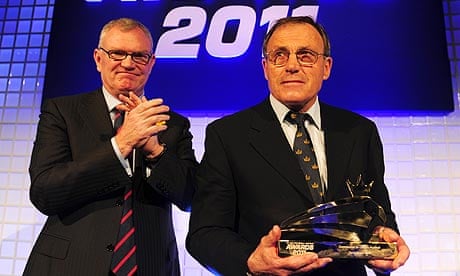Dario Gradi does not really need any more recognition. He has plenty of that. Despite spending his 33-year managerial career in the mid-to-lower tiers of the Football League, Gradi has been one of English football's most lionised low-key eminences, revered for coaching skills that have seen him groom via his Crewe Alexandra finishing school the tyro talents of David Platt, Rob Jones, Danny Murphy, Neil Lennon, Dean Ashton and David Vaughan, among others.
This is a man who already has a road and a chart-topping dance act named in his honour (Dario Gradi Drive in Crewe; and 90s techno-popsters Dario G). Now in his 70th year and 28th – almost uninterrupted – as Crewe's manager, Gradi has been garlanded further with the Contribution to League Football Award presented to him at the annual Football League Awards dinner on Sunday evening.
"It's always nice," Gradi says of his latest, far from insubstantial, gong. "I have had awards like this before. I've got quite a few Royal Doulton vases on the side at home. I suppose it's a surprise in that I thought I'd be finishing a while back. But it's always nice to be appreciated by people in football."
It is perhaps appropriate that Gradi sounds pleased, but some way short of gushing. As a coach he has acquired the status of a revered, priestly, but still peripheral figure in a nation that, measuring achievement against population, squanders its resources like no other. Gradi is a coaching guru in a country that does not value coaching enough. And while his longevity at Crewe is often celebrated, it goes hand in hand with having never secured a top job anywhere else, or been appointed to the kind of centralised coaching overseer's role English football currently lacks. Gradi is softly spoken and wryly humorous. He never sounds particularly cross. But does it ever make him feel cross?
"I had an opportunity some years ago with the FA to become technical director. I had an interview the same day as Howard Wilkinson, who ended up doing an excellent job. The FA didn't seem to be able to make up their minds. I'd like to have taken the job, but I wasn't sure I would have been able to have much influence. Was I going to go into a Premier League club and say: 'You're not coaching the kids right, you've got to do it another way.' The way the politics are in our set-up, it's not possible to tell clubs how to run their academies.
"We haven't even got a technical director now," he adds, almost but not quite managing to maintain a diplomatic silence on a subject he feels passionately about. "Gareth Southgate has been appointed something or other by the FA. I really don't know what his job is. Perhaps he does. I'm not sure what record he's got of developing young players. He comes over on television as a very pleasant and intelligent guy. But it's hard to see what it is the FA want him to do."
There is a sense of the one who got away in all this, mainly because going into clubs and telling them how to coach their young players is something Gradi would be ideally qualified to do. Where would he have started had he ever had the chance?
"Not lumping the ball forward," he says. "There used to be an expression coaches used: 'Put them under.' I used to think, "What the bloody hell does that mean?" Six feet under? They were on about pressurising, with the kids. I've never done that. With kids we talk about can you get hold of the ball and can you do something with it. Can you keep the ball? Can you pass and move?"
Gradi's own influences were the English coaching intelligentsia of the late-70s, Dave Sexton, Don Howe, Bobby Robson and the young Terry Venables – "they opened my eyes". He hails the current Barcelona team as "a model", but stops short of spurning what might be called the first principles of the more direct English style. "You can't do what Barcelona do if your players aren't as good as their players. Although it looks easy, to receive the ball under pressure, it requires a really high level of skill. Plus you can't teach the confidence, the mental side of that kind of play."
Gradi is perhaps the only current manager likely to enthuse in the same breath over both Catalonian keep-ball and the former FA coaching guru Charles Hughes, high priest of direct football and the man who in the opinion of the football writer Brian Glanville "poisoned the wells" for generations of English footballers.
"I was lucky to work with Charles Hughes, who people don't regard highly as a coach. But I did. He organised teams not to lose. Against teams with better players he organised teams better than anyone I've seen. Charles Hughes never put on a session for flair and adventure. But if you made a mistake in defence you always knew he wouldn't miss it."
If the Gradi school of cottage industry player-production faces a challenge now it is not ideological, but economic. In the same week the Football League has honoured his achievements, the Premier League has been discussing a liberalisation of club academies that would allow bigger clubs to scour the country and scoop up talent regardless of geography, potentially cutting off the supply line for smaller fry such as Crewe.
Gradi, hearteningly, is unperturbed. "It's a challenge," he says. "But we've already got Manchester United, City, Liverpool and Everton all within our boundary. The kids will still go to the local club. You just have to make sure what you're providing is good enough."
For more information on The Football League Awards 2011 visit www.FLawards.com

